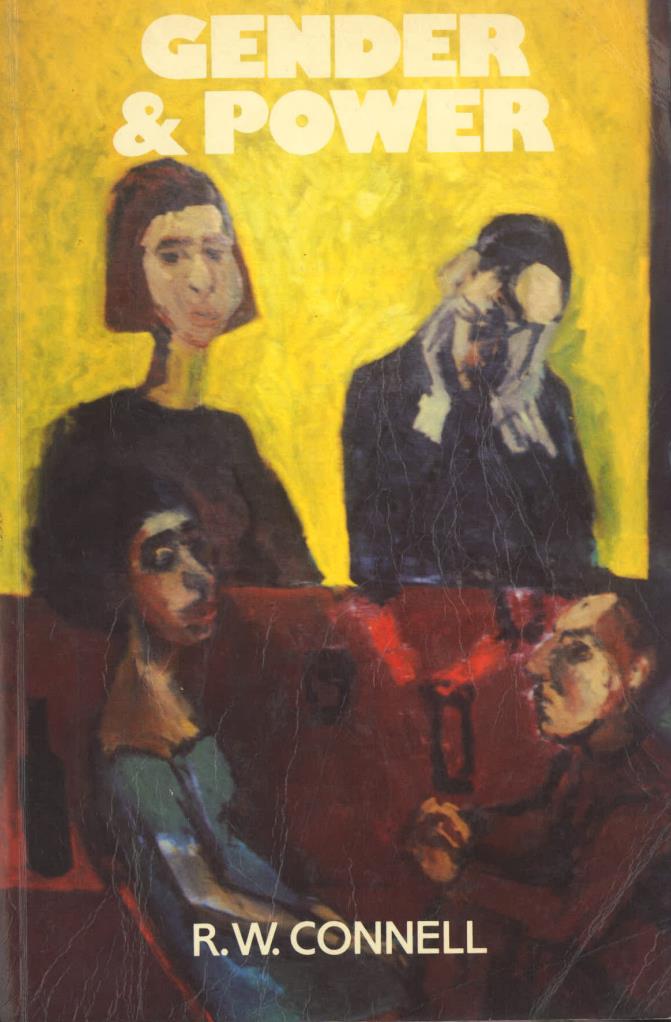
HENDER &P⊙NE R.W.CONNELL
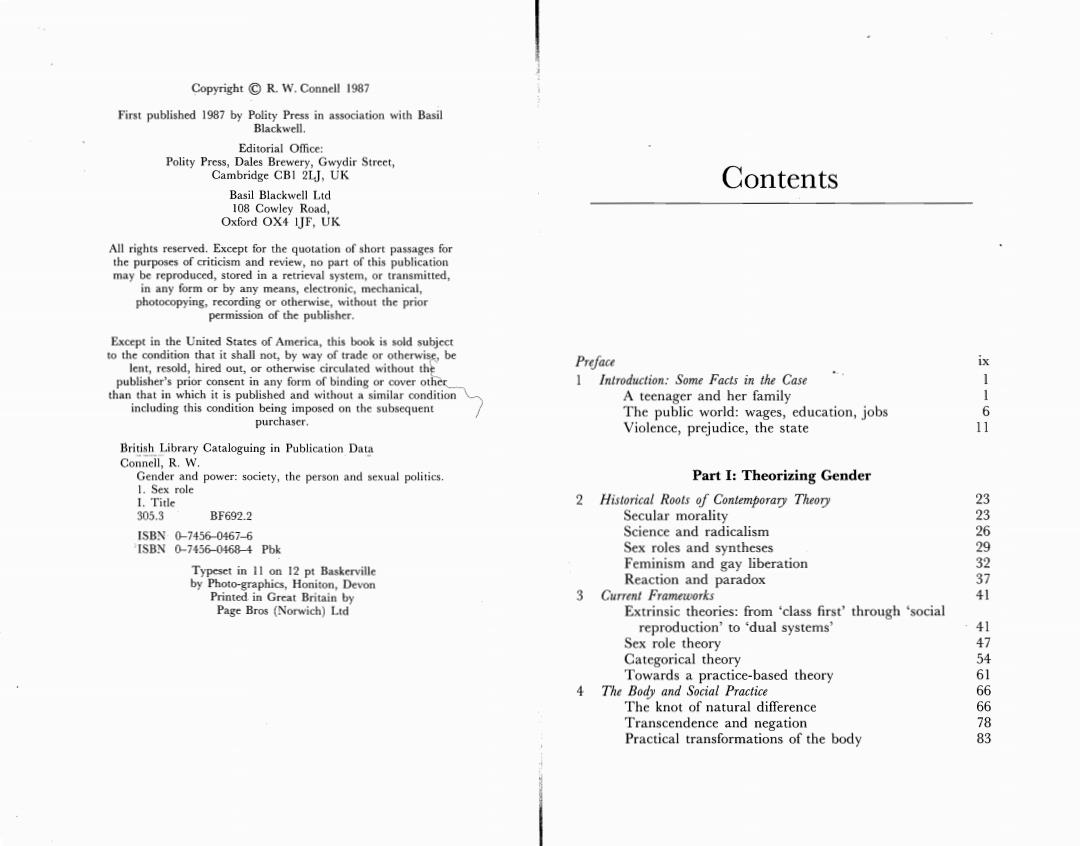
Copyright C R.W.Connell 1987 First published 1987 by Polity Press in association with Basil Blackwell. Editorial Office: Polity Press,Dales Brewery,Gwydir Street, Cambridge CBI 2LJ,UK Contents Basil Blackwell Ltd 108 Cowley Road, Oxford OX4 IJF,UK All rights reserved.Except for the quotation of short passages for the purposes of criticism and review,no part of this publication may be reproduced,stored in a retrieval system,or transmitted, in any form or by any means,electronic,mechanical, photocopying,recording or otherwise,without the prior permission of the publisher. Except in the United States of America,this book is sold subject to the condition that it shall not,by way of trade or otherwise,be ix lent,resold,hired out,or otherwise circulated without the Preface publisher's prior consent in any form of binding or cover other 1 Introduction:Some Facts in the Case than that in which it is published and without a similar condition A teenager and her family 1 including this condition being imposed on the subsequent The public world:wages,education,jobs 6 purchaser. Violence,prejudice,the state 11 British Library Cataloguing in Publication Data Connell,R.W Gender and power:socicty,the person and sexual politics. Part I:Theorizing Gender 1.Sex role 1.Title 2 Historical Roots of Contemporary Theory 23 305.3 BF692.2 Secular morality 3 ISBN0-7456-0467-6 Science and radicalism 26 ISBN0-7456-0468-4Pbk Sex roles and syntheses 2 Typeset in 11 on 12 pt Baskerville Feminism and gay liberation 3 by Photo-graphics,Honiton,Devon Reaction and paradox 37 Printed in Great Britain by 3 Current Frameworks 41 Page Bros (Norwich)Ltd Extrinsic theories:from'class first'through 'social reproduction'to 'dual systems' 41 Sex role theory 47 Categorical theory 54 Towards a practice-based theory 61 4 The Body and Social Practice 66 The knot of natural difference 66 Transcendence and negation 8 Practical transformations of the body 83
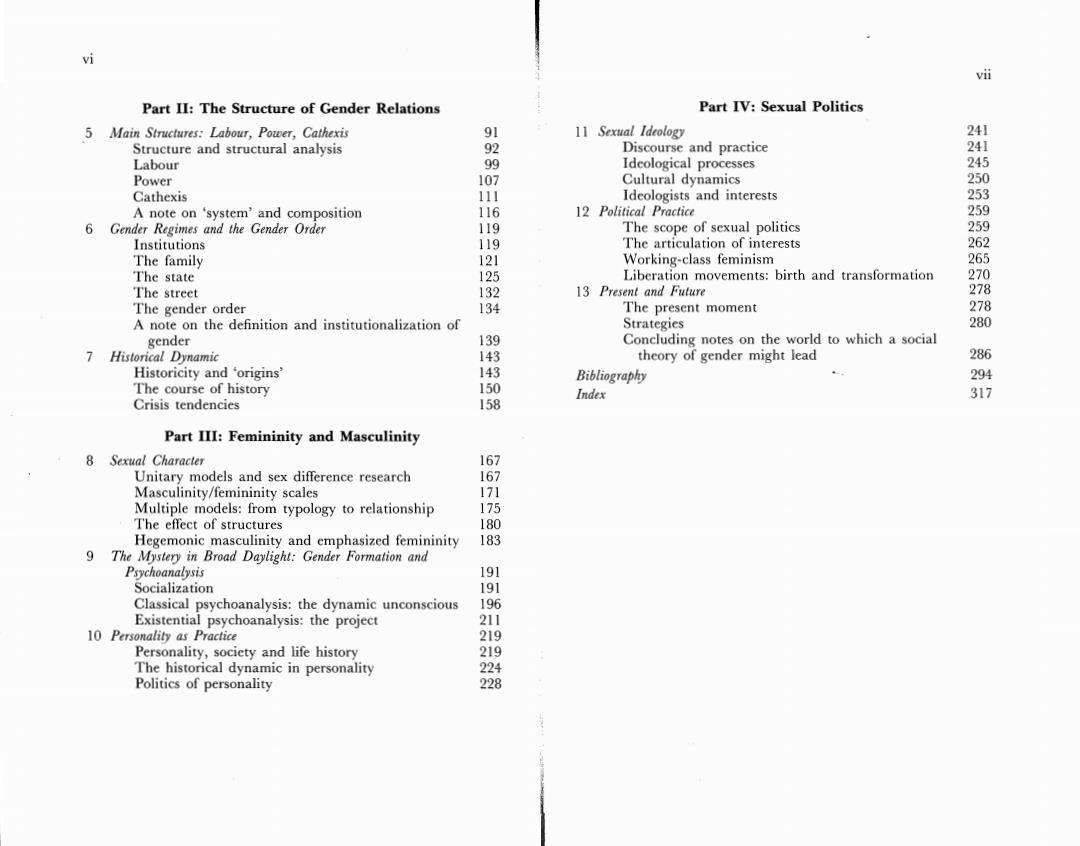
vi vii Part II:The Structure of Gender Relations Part IV:Sexual Politics 5 Main Structures:Labour,Power,Cathexis 91 11 Sexual Ideology 241 Structure and structural analysis 92 Discourse and practice 241 Labour 99 Ideological processes 245 Power 107 Cultural dynamics 250 Cathexis 111 Ideologists and interests 253 A note on 'system'and composition 116 12 Political Practice 259 6 Gender Regimes and the Gender Order 119 The scope of sexual politics 259 Institutions 119 The articulation of interests 262 The family 121 Working-class feminism 265 The state 125 Liberation movements:birth and transformation 270 The street 132 13 Present and Future 278 The gender order 134 The present moment 278 A note on the definition and institutionalization of Strategies 280 gender 139 Concluding notes on the world to which a social 7 Historical Dynamic 143 theory of gender might lead 286 Historicity and 'origins' 143 Bibliography 294 The course of history 150 Index 317 Crisis tendencies 158 Part III:Femininity and Masculinity 8 Sexual Character 167 Unitary models and sex difference research 167 Masculinity/femininity scales 171 Multiple models:from typology to relationship 175 The effect of structures 180 Hegemonic masculinity and emphasized femininity 183 9 The Mystery in Broad Daylight:Gender Formation and Psychoanalysis 191 Socialization 191 Classical psychoanalysis:the dynamic unconscious 196 Existential psychoanalysis:the project 211 10 Personality as Practice 219 Personality,society and life history 219 The historical dynamic in personality 224 Politics of personality 228
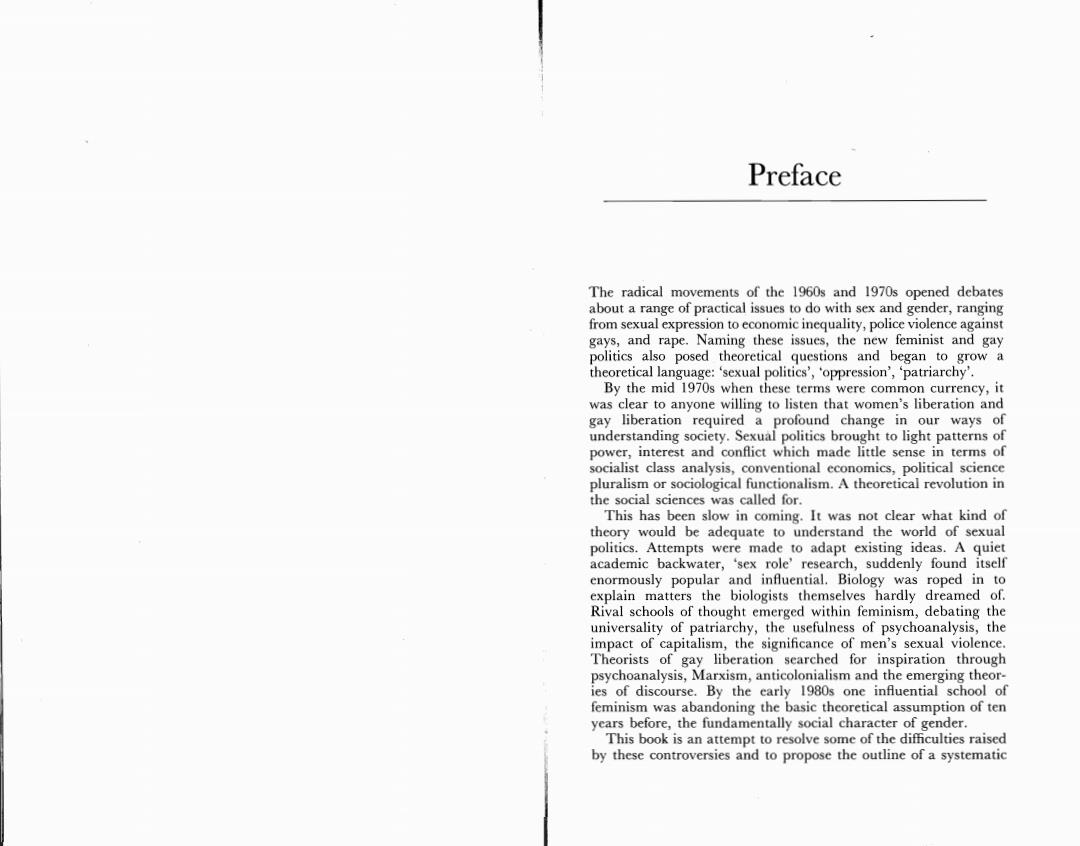
Preface The radical movements of the 1960s and 1970s opened debates about a range of practical issues to do with sex and gender,ranging from sexual expression to economic inequality,police violence against gays,and rape.Naming these issues,the new feminist and gay politics also posed theoretical questions and began to grow a theoretical language:'sexual politics','oppression',patriarchy'. By the mid 1970s when these terms were common currency,it was clear to anyone willing to listen that women's liberation and gay liberation required a profound change in our ways of understanding society.Sexual politics brought to light patterns of power,interest and conflict which made little sense in terms of socialist class analysis,conventional economics,political science pluralism or sociological functionalism.A theoretical revolution in the social sciences was called for. This has been slow in coming.It was not clear what kind of theory would be adequate to understand the world of sexual politics.Attempts were made to adapt existing ideas.A quiet academic backwater,'sex role'research,suddenly found itself enormously popular and influential.Biology was roped in to explain matters the biologists themselves hardly dreamed of. Rival schools of thought emerged within feminism,debating the universality of patriarchy,the usefulness of psychoanalysis,the impact of capitalism,the significance of men's sexual violence. Theorists of gay liberation searched for inspiration through psychoanalysis,Marxism,anticolonialism and the emerging theor- ies of discourse.By the early 1980s one influential school of feminism was abandoning the basic theoretical assumption of ten years before,the fundamentally social character of gender. This book is an attempt to resolve some of the difficulties raised by these controversies and to propose the outline of a systematic
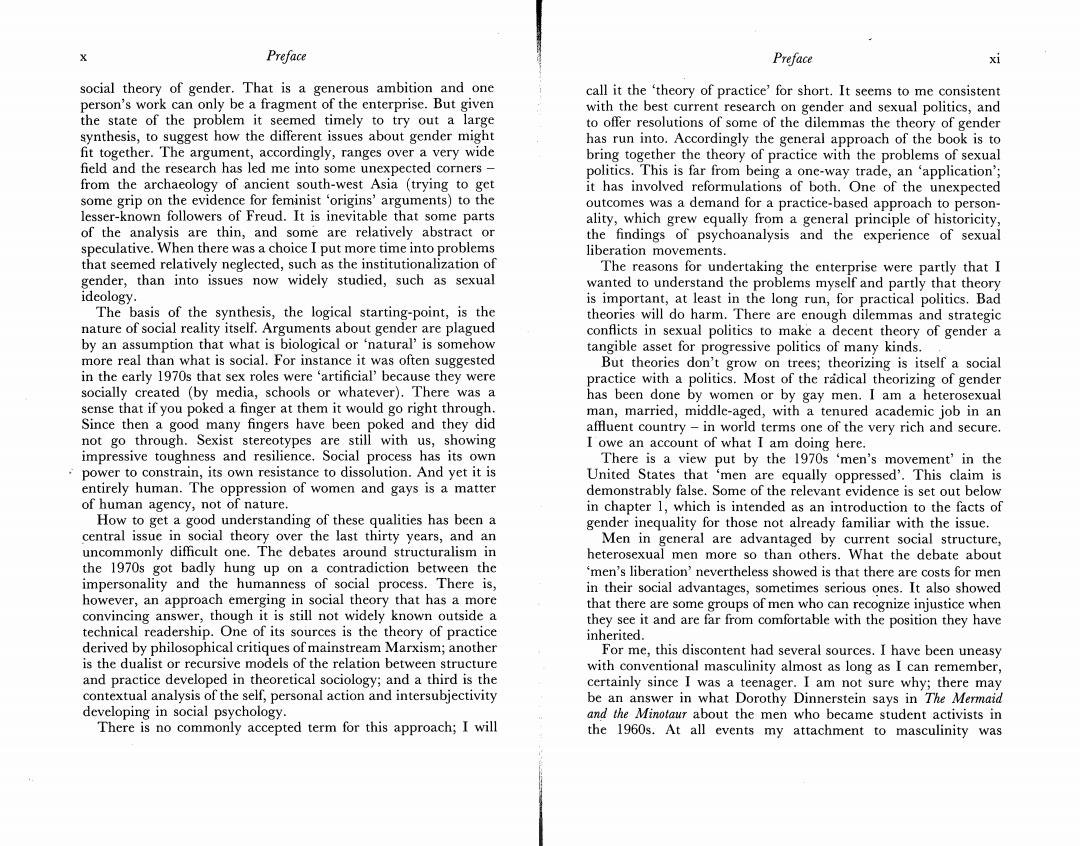
X Preface Preface xi social theory of gender.That is a generous ambition and one call it the 'theory of practice'for short.It seems to me consistent person's work can only be a fragment of the enterprise.But given with the best current research on gender and sexual politics,and the state of the problem it seemed timely to try out a large to offer resolutions of some of the dilemmas the theory of gender synthesis,to suggest how the different issues about gender might has run into.Accordingly the general approach of the book is to fit together.The argument,accordingly,ranges over a very wide bring together the theory of practice with the problems of sexual field and the research has led me into some unexpected corners politics.This is far from being a one-way trade,an application'; from the archaeology of ancient south-west Asia (trying to get it has involved reformulations of both.One of the unexpected some grip on the evidence for feminist'origins'arguments)to the outcomes was a demand for a practice-based approach to person- lesser-known followers of Freud.It is inevitable that some parts ality,which grew equally from a general principle of historicity, of the analysis are thin,and some are relatively abstract or the findings of psychoanalysis and the experience of sexual speculative.When there was a choice I put more time into problems liberation movements. that seemed relatively neglected,such as the institutionalization of The reasons for undertaking the enterprise were partly that I gender,than into issues now widely studied,such as sexual wanted to understand the problems myself and partly that theory ideology. is important,at least in the long run,for practical politics.Bad The basis of the synthesis,the logical starting-point,is the theories will do harm.There are enough dilemmas and strategic nature of social reality itself.Arguments about gender are plagued conflicts in sexual politics to make a decent theory of gender a by an assumption that what is biological or natural'is somehow tangible asset for progressive politics of many kinds. more real than what is social.For instance it was often suggested But theories don't grow on trees;theorizing is itself a social in the early 1970s that sex roles were'artificial'because they were practice with a politics.Most of the radical theorizing of gender socially created (by media,schools or whatever).There was a has been done by women or by gay men.I am a heterosexual sense that if you poked a finger at them it would go right through. man,married,middle-aged,with a tenured academic job in an Since then a good many fingers have been poked and they did affluent country-in world terms one of the very rich and secure. not go through.Sexist stereotypes are still with us,showing I owe an account of what I am doing here. impressive toughness and resilience.Social process has its own There is a view put by the 1970s 'men's movement'in the power to constrain,its own resistance to dissolution.And yet it is United States that 'men are equally oppressed'.This claim is entirely human.The oppression of women and gays is a matter demonstrably false.Some of the relevant evidence is set out below of human agency,not of nature. in chapter 1,which is intended as an introduction to the facts of How to get a good understanding of these qualities has been a gender inequality for those not already familiar with the issue. central issue in social theory over the last thirty years,and an Men in general are advantaged by current social structure, uncommonly difficult one.The debates around structuralism in heterosexual men more so than others.What the debate about the 1970s got badly hung up on a contradiction between the 'men's liberation'nevertheless showed is that there are costs for men impersonality and the humanness of social process.There is, in their social advantages,sometimes serious ones.It also showed however,an approach emerging in social theory that has a more that there are some groups of men who can recognize injustice when convincing answer,though it is still not widely known outside a they see it and are far from comfortable with the position they have technical readership.One of its sources is the theory of practice inherited. derived by philosophical critiques of mainstream Marxism;another For me,this discontent had several sources.I have been uneasy is the dualist or recursive models of the relation between structure with conventional masculinity almost as long as I can remember, and practice developed in theoretical sociology;and a third is the certainly since I was a teenager.I am not sure why;there may contextual analysis of the self,personal action and intersubjectivity be an answer in what Dorothy Dinnerstein says in The Mermaid developing in social psychology. and the Minotaur about the men who became student activists in There is no commonly accepted term for this approach;I will the 1960s.At all events my attachment to masculinity was